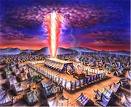
| Next | Previous | Index | Tellout Home |
48. Roman Empire Beast
Revelation 13.1-7
"And the dragon stood on the seashore. And I saw a beast coming out of the sea. It had ten horns and seven heads, with ten crowns on its horns and each head a blasphemous name. The beast I saw resembled a leopard but had a bear's feet and a lion's mouth. The dragon gave the beast his power, throne, and great authority. One of the beast's heads seemed to have had a fatal wound, but it had healed. The whole world was wonder-struck and followed the beast. Men worshiped the dragon because he had given the beast authority, and also the beast, and asked, 'Who is like the beast? Who can wage war against it?' The beast received a mouth to utter proud words, blasphemies and exercise its authority for forty-two months. It opened its mouth to blaspheme God, to slander his name, his dwelling place, and those living in heaven. God gave it the power to make war against his holy people and to conquer them. It received authority over every tribe, people, language, and nation." (Revelation 13.1-7) ✞
The Lord's Dwelling
 Here we have a picture of John of Patmos standing on the seashore, staring out to sea, and seeing a beast emerging from the water. This Roman Empire beast's power represented the Emperors. They controlled vast Mediterranean resources, governed 70 million people, and instituted Caesar worship as one way of keeping firm control over the people. However, according to the Early Church, Caesar's worship was a blasphemy against God, the heavens, and the angels. The Romans incurred extreme Jewish anger by erecting these Roman deities' images in the Temple's Holy of Holies. If ever there is a grave insult to God's Temple, the worship of Caligula was it. The Jewish nation would suffer extermination rather than submit to such Holy Place desecration. The Greek word for God's "dwelling place" is "skene," meaning a "tent," "tabernacle," or "a place to dwell." "Skene" reminded Jewish people of the Hebrew "shechinah" or "the dwelling of God's glory." A rabbi saying stated that "if two sat at a table and conversed about God's Law, the "Shechinah" rested upon them." It may be that John of Patmos was saying that the Roman Empire's conduct, particularly regarding caesar worship, was an insult to God's glory or Shechinah. ✞
Here we have a picture of John of Patmos standing on the seashore, staring out to sea, and seeing a beast emerging from the water. This Roman Empire beast's power represented the Emperors. They controlled vast Mediterranean resources, governed 70 million people, and instituted Caesar worship as one way of keeping firm control over the people. However, according to the Early Church, Caesar's worship was a blasphemy against God, the heavens, and the angels. The Romans incurred extreme Jewish anger by erecting these Roman deities' images in the Temple's Holy of Holies. If ever there is a grave insult to God's Temple, the worship of Caligula was it. The Jewish nation would suffer extermination rather than submit to such Holy Place desecration. The Greek word for God's "dwelling place" is "skene," meaning a "tent," "tabernacle," or "a place to dwell." "Skene" reminded Jewish people of the Hebrew "shechinah" or "the dwelling of God's glory." A rabbi saying stated that "if two sat at a table and conversed about God's Law, the "Shechinah" rested upon them." It may be that John of Patmos was saying that the Roman Empire's conduct, particularly regarding caesar worship, was an insult to God's glory or Shechinah. ✞
Caligula's Madness
 The description of the Roman Empire beast may indicate that John of Patmos is thinking of all the ways, not just those in his own time, in which the Roman Empire had insulted God and his Jerusalem dwelling place. Some Roman Emperors were embarrassed by Caesar's worship, but not Emperor Caligula (12-41 AD), who had epilepsy and was also, unfortunately, more than a little mad in his later life. He was nicknamed "the little soldier's boot" by his father's soldiers when he accompanied their Northern European campaigns. For the first six months of his reign, Caligula was a noble and moderate ruler. After that, he became an insane tyrant. He took his beliefs seriously, insisting all his subjects worship him, including Jewish persons and Christians. Every Roman Empire dweller had to burn incense yearly to his image. ✞
The description of the Roman Empire beast may indicate that John of Patmos is thinking of all the ways, not just those in his own time, in which the Roman Empire had insulted God and his Jerusalem dwelling place. Some Roman Emperors were embarrassed by Caesar's worship, but not Emperor Caligula (12-41 AD), who had epilepsy and was also, unfortunately, more than a little mad in his later life. He was nicknamed "the little soldier's boot" by his father's soldiers when he accompanied their Northern European campaigns. For the first six months of his reign, Caligula was a noble and moderate ruler. After that, he became an insane tyrant. He took his beliefs seriously, insisting all his subjects worship him, including Jewish persons and Christians. Every Roman Empire dweller had to burn incense yearly to his image. ✞
Caesar Worship
 Jewish persons were generally exempt from caesar worship. The Romans were well aware of Jewish and later Christians' monotheistic beliefs and their absolute allegiance to God, excluding all others. Across the Empire, Jewish persons were exempt from military service because of their strict adherence to food laws and the Sabbath's absolute observance. However, certain emperors' decided to introduce it to gain authority over the people and consolidate their power. Emperor Caligula (12-41 AD) insisted on mandatory caesar worship every year. Christians were probably considered a Jewish sect. On January 3rd, every year, the "Sacramentum" annual oath was sworn by the army to the emperor. In every Empire military unit, the Romans consecrated a new altar to Jupiter Optimus Maximus, described as "the best and greatest god." John of Patmos called this "worshipping the beast." This incident may have been in John's mind when he spoke of the torments the beast launched against God's dwelling place. While forming an army to enforce his demands, Praetorian Guard officers, senators, and courtiers assassinated Caligula in 41 AD. ✞
Jewish persons were generally exempt from caesar worship. The Romans were well aware of Jewish and later Christians' monotheistic beliefs and their absolute allegiance to God, excluding all others. Across the Empire, Jewish persons were exempt from military service because of their strict adherence to food laws and the Sabbath's absolute observance. However, certain emperors' decided to introduce it to gain authority over the people and consolidate their power. Emperor Caligula (12-41 AD) insisted on mandatory caesar worship every year. Christians were probably considered a Jewish sect. On January 3rd, every year, the "Sacramentum" annual oath was sworn by the army to the emperor. In every Empire military unit, the Romans consecrated a new altar to Jupiter Optimus Maximus, described as "the best and greatest god." John of Patmos called this "worshipping the beast." This incident may have been in John's mind when he spoke of the torments the beast launched against God's dwelling place. While forming an army to enforce his demands, Praetorian Guard officers, senators, and courtiers assassinated Caligula in 41 AD. ✞
The Beast's Authority
 In Revelation 13.5, the beast's authority allowed it to make war on the earth for forty-two months, the equivalent of three and a half years, a Biblical symbol of incompleteness. The beast cursed God and slandered his name. The sea was one of the places where many people in the Roman era believed the demons lived. When a sailor fell overboard and drowned, people thought the devils below the water caused his drowning! The Jews did not, therefore, generally sail out of sight of land, but their boats stayed close to shore. The Jews thought other demons dwelt in the desert for similar reasons, and Jesus specifically met the Devil at his desert wilderness temptation. During Solomon's reign, Phoenician sailors imported beautiful goods from across the Mediterranean and carried out exports from a prosperous Israel. Jonah boarded a foreign Nineveh vessel crewed by non-Jews. The Revelation beast had a mouth showing that Satan, a higher power, controlled it. The question is, "Would you worship another God or choose persecution instead?" ✞
In Revelation 13.5, the beast's authority allowed it to make war on the earth for forty-two months, the equivalent of three and a half years, a Biblical symbol of incompleteness. The beast cursed God and slandered his name. The sea was one of the places where many people in the Roman era believed the demons lived. When a sailor fell overboard and drowned, people thought the devils below the water caused his drowning! The Jews did not, therefore, generally sail out of sight of land, but their boats stayed close to shore. The Jews thought other demons dwelt in the desert for similar reasons, and Jesus specifically met the Devil at his desert wilderness temptation. During Solomon's reign, Phoenician sailors imported beautiful goods from across the Mediterranean and carried out exports from a prosperous Israel. Jonah boarded a foreign Nineveh vessel crewed by non-Jews. The Revelation beast had a mouth showing that Satan, a higher power, controlled it. The question is, "Would you worship another God or choose persecution instead?" ✞
"Roman Empire Beast"
by Ron Meacock © 2021
| ^Top Page | Next | Previous |